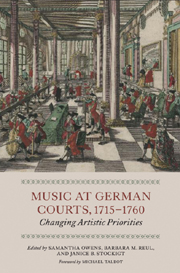Book contents
- Frontmatter
- Contents
- List of Tables
- Foreword
- Preface
- Editorial Notes
- Notes on Contributors
- List of Abbreviations
- 1 ‘Das gantze Corpus derer musicirenden Personen’: An Introduction to German Hofkapellen
- KINGDOMS AND ELECTORATES
- 2 The Court of Saxony-Dresden
- 3 The Saxon Court of the Kingdom of Poland
- 4 The Court of Brandenburg-Prussia
- 5 The Palatine Court in Mannheim
- DUCHIES
- PRINCIPALITIES AND PRINCE-BISHOPRICS
- LANDGRAVIATES AND MARGRAVIATES
- Index
2 - The Court of Saxony-Dresden
from KINGDOMS AND ELECTORATES
Published online by Cambridge University Press: 12 September 2012
- Frontmatter
- Contents
- List of Tables
- Foreword
- Preface
- Editorial Notes
- Notes on Contributors
- List of Abbreviations
- 1 ‘Das gantze Corpus derer musicirenden Personen’: An Introduction to German Hofkapellen
- KINGDOMS AND ELECTORATES
- 2 The Court of Saxony-Dresden
- 3 The Saxon Court of the Kingdom of Poland
- 4 The Court of Brandenburg-Prussia
- 5 The Palatine Court in Mannheim
- DUCHIES
- PRINCIPALITIES AND PRINCE-BISHOPRICS
- LANDGRAVIATES AND MARGRAVIATES
- Index
Summary
DRESDEN – SEAT OF TWO SUCCESSIVE Saxon electors from the house of Wettin and elected kings of Poland – exemplifies a brilliant European court whose cultural climate and musical excellence was, by the mid-eighteenth century, equal to the best then offered. Developments of this era owed much to the personalities, tastes, and change of confession of the rulers whose leadership covered the years of the snapshots. For more than fifty years the music of Dresden reflected first the preference for French culture of Saxon Elector Friedrich August I (1670–1733; as king of Poland titled August II ‘the Strong’). On the other hand the highly developed musical tastes of his son and successor, Electoral Prince Friedrich August II (1696–1763), and his eldest surviving son and heir, Electoral Prince Friedrich Christian (1722–1763), veered towards Italy. After election as king of Poland in October 1733 and coronation in January 1734, Friedrich August II – now titled August III – and his Habsburg-born consort Maria Josepha (1699–1757) provided powerful musical patronage in Dresden. They and family members often determined the selection of musicians and repertoire for Dresden, whose court witnessed musical advances that came to have far-reaching effects upon contemporary developments, musical standards, and continuing musical institutions.
The sons and daughters of August III and Maria Josepha contributed to this enlightened musical patronage, with strong musical connections established through marriages between Dresden and the courts of Naples, Munich, and Versailles.
- Type
- Chapter
- Information
- Music at German Courts, 1715–1760Changing Artistic Priorities, pp. 17 - 50Publisher: Boydell & BrewerPrint publication year: 2011

